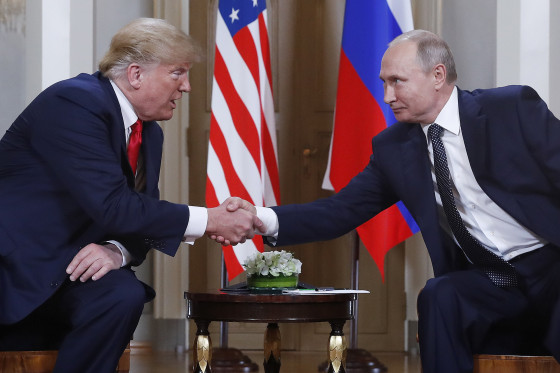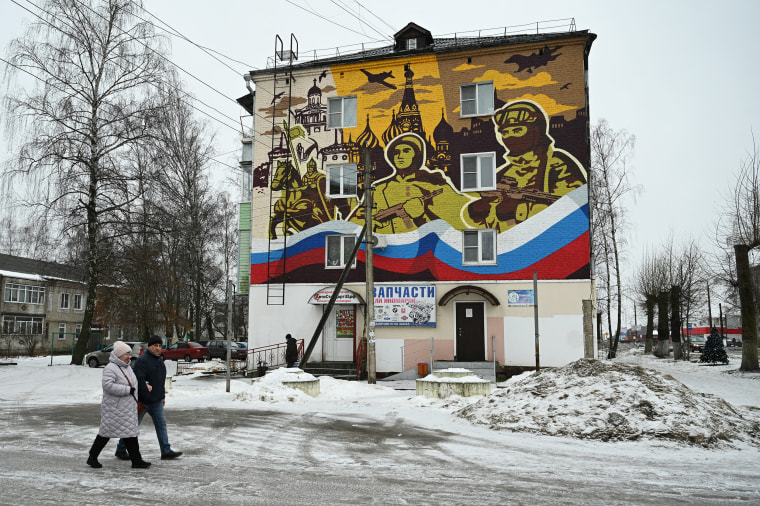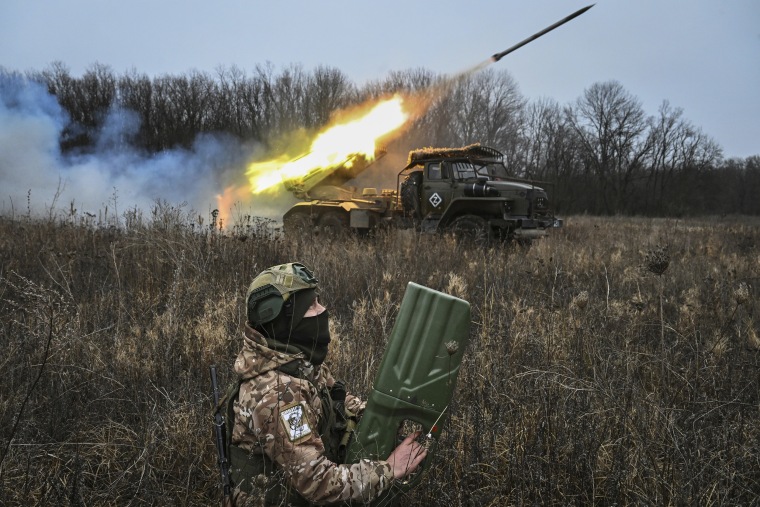By Alexander Smith, NBC News
The Kremlin said Friday that it welcomed the president-elect’s willingness to talk and that there would likely be progress on the subject after he is sworn in later this month.

President Trump and Russian President Vladimir Putin meet in Finland in 2018. Pablo Martinez Monsivais / AP file
President-elect Donald Trump said late Thursday that a meeting is being arranged with his Russian counterpart, Vladimir Putin, a summit that would be eyed anxiously by Ukraine and its other Western allies.
“President Putin wants to meet” and “we are setting it up,” Trump told a news briefing at his Mar-a-Lago residence in Florida. “We have to get that war over with. That’s a bloody mess.”
Trump has previously suggested he would seek to end Russia’s war in Ukraine, now approaching the three-year mark, within 24 hours of assuming office.
Russia says it is open to to dialogue and diplomacy — although critics say that in reality its proposals amount to little more than a Ukrainian surrender.
“President Putin has repeatedly stated his openness to contacts with international leaders, including the U.S. president, including with Donald Trump,” Kremlin spokesman Dmitry Peskov said Friday. “No conditions are required for this, what is required is a mutual desire and political will to conduct a dialogue.”
Peskov said Trump’s overtures were “welcome” but added there were “no specifics” on dates. “After Mr. Trump assumes office, there will be some developments.”
Ukraine knows that while many inside the country are alarmed at Trump’s stance, its relationship with the White House is nonetheless essential in its territorial future and sovereignty.
It said Friday it was “waiting for a meeting between our presidents because for us the main thing is to work together with America,” Foreign Ministry spokesman Heorhii Tykhyi told reporters in Kyiv. It said it was “preparing for contacts at the highest and high levels immediately after the inauguration.”

While Ukraine would be unlikely to criticize Trump directly, its officials have chided other world leaders for engaging with Putin. “Conversations with the Russian dictator as such do not add any value to the pursuit of a just peace,” Tykhyi posted to X in November, referring to a call between German Chancellor Olaf Scholz and the the Russian leader.
Putin has indicated he will not accept any diplomatic end to the war without Ukraine agreeing to cede huge swathes of territory to Moscow. It also wants guarantees Ukraine will never join NATO.
Many in Europe worry Putin could then turn his ambitions to other former Soviet countries, particularly given Trump’s previous record of undermining the NATO alliance under which these Westernized states have been historically protected.
“We want peace, but peace through strength,” NATO Secretary General Mark Rutte said in a speech last month.
Kyiv is currently suffering battlefield setbacks as Russian troops steadily advance through the frozen fields of its eastern heartlands, with Moscow claiming to have captured the front-line town of Kurakhove this week.
Kyiv has also launched its own new offensive in Russia’s Kursk region, possibly to strengthen its hand in future talks.

Trump has more recently relaxed his 24-hour ambitions, saying earlier this week that he hoped to have the conflict solved within “six months.” Keith Kellogg, his appointee for special envoy in the war, separately set the goal of “100 days.”
Still, this is a far remove the strategy of President Joe Biden, who has met Putin only once while in office, at a June 2021 summit in Geneva, otherwise describing him as “a killer” and a “dictator.”
Biden has overseen some $170 billion in aid for Ukraine, telling his Ukrainian counterpart, Volodymyr Zelenskyy, this summer that “we will be with Ukraine until they prevail in this war.”
Zelenskyy says he is grateful for this support, but he and other officials have complained that some of the military aid has been too slow and too little. Trump has suggested it is too much.
Zelenskyy acknowledged Thursday that a “new chapter” was about to begin under Trump, and urged Western allies “not to drop the ball” on supporting Ukraine as a bulwark against Moscow.







